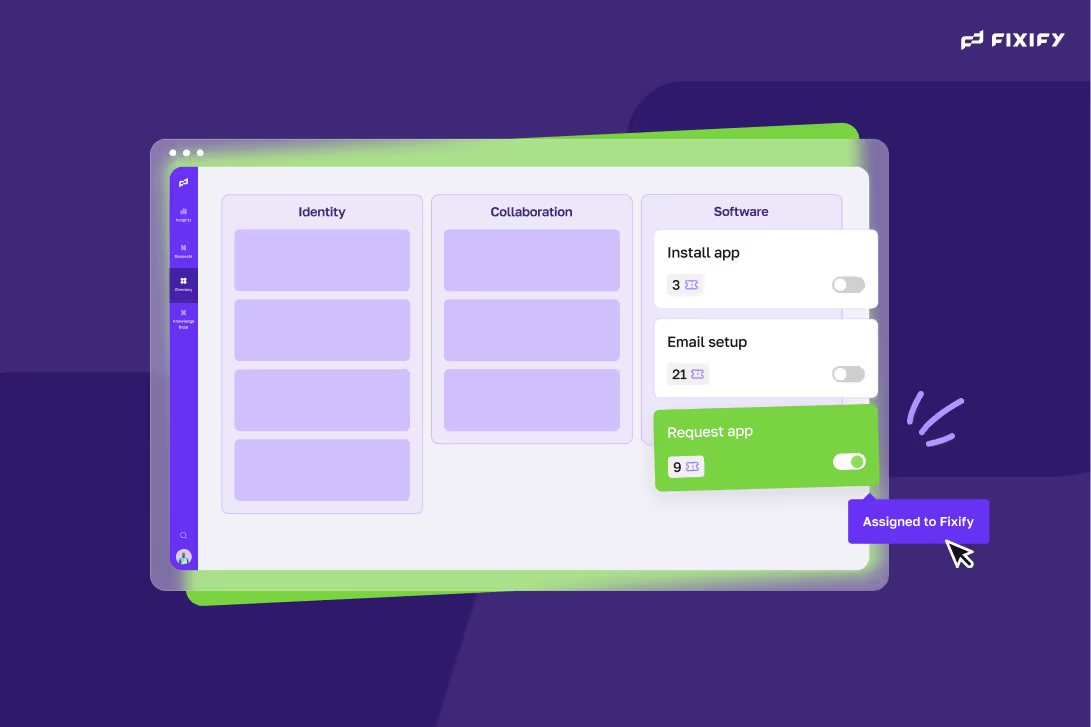Suggest-a-Playbook: Unlocking the right guidance at the right time

.avif)
Listen to this blog as a podcast

.avif)
If you’ve ever watched The Floor is Lava on Netflix, you know the premise: under pressure, you’re scrambling to make the right moves before the floor disappears and the lava swallows you up.
That’s what working a help desk ticket can feel like. A request comes in vague, half-formed, maybe even misleading. You think it’s a provisioning request… then realize it’s troubleshooting. Suddenly you’re pivoting tools, switching context, and digging through a mountain of playbooks — all while someone waits on the other end, stuck.
Every extra minute spent searching is time an end-user stays blocked. That’s the paradox of playbooks: the better your documentation, the more you have, and the harder it becomes to find what you need, when you need it.
So we asked ourselves: what if the right playbook simply found you?
That’s why we built Suggest-a-Playbook – real-time, context-aware playbook recommendations delivered at the right time.
What does it do?
At its core, Suggest-a-Playbook analyzes the context of a ticket in real time and surfaces the most relevant playbooks directly in the convo UI and Knowledge Base sidebar. No more tab-hopping, no more library spelunking — the right playbook is right there, waiting for the analysts.
And because feedback is built in, it learns as you go. A quick thumbs-up or thumbs-down is all it takes to tell the system what worked, and those signals make the next recommendation sharper.
Most importantly, it helps analysts do what they care about most: resolving tickets fast. With the right playbook at their fingertips they can execute the workflow and trigger automations — so instead of digging through clutter, they’re actually moving things forward.
Whether it’s a new hire on day one or a seasoned analyst facing an unfamiliar customer environment, the right playbook is always there when they need it.
What’s cool about Suggest-a-Playbook
| Built-in learning loop | Analysts guide the system with quick feedback, and it gets smarter over time. |
| Instant access | The right playbook appears without hunting, whether you’re brand new or have years of experience. |
| Fewer handoffs | Analysts can solve more by themselves, without bouncing tickets between teammates. |
| Faster resolutions | With the right guidance in the right moment, tickets move from open to solved more quickly. |
What challenges did we have to solve?
Getting there wasn’t straightforward. On paper, “recommend the right playbook” sounds simple. In practice, it forced us to tackle some thorny problems:
1. Aligning tickets with playbooks
Tickets are messy and human: “this thing broke.” Playbooks are structured and precise: “Step 1, reset Okta token.” That mismatch meant direct text-to-text matching falls short.
- We added a query transformation layer to reframe ticket language into something more “playbook-like.”
- We introduced a reranker so the “best” playbook wasn’t just the one with the highest cosine similarity, but the one with the strongest contextual relevance.
2. Latency trade-offs
At first, we designed with a generous latency budget (P99 around one minute). That was fine when the only use case was Suggest-a-Playbook itself. But as adoption grew, new needs emerged.
Triage, for example, demanded sub-200ms responses to make real-time yes/no decisions. Meeting those diverging needs meant designing new configurations and optimizations.
3. Shifting playbook structure
Over time, our playbooks matured. We broke down monolithic guides into modular components that analysts could use more effectively. The tradeoff was added complexity:
- Some requests required multiple playbooks for a complete solution.
- The features consuming this information each had different needs – some needed a wide set of results to compare, others thrived on precise one-to-one matching, and still others prioritized speed above all else.
We learned there isn’t always one “best” playbook — which makes flexibility and configurability essential.
Closing thoughts
Suggest-a-Playbook started as a way to ease analyst friction, but it’s grown into something bigger: a shared service that supports humans and AI agents alike. By unifying logic into a single, configurable system, we avoided a sprawl of one-off solutions — and created a foundation that adapts to evolving needs.
Or to go back to The Floor is Lava: you’re no longer guessing the next jump on your own. Now, Suggest-a-Playbook is the teammate guiding your move before the lava rises.
Related articles

Agentic AI can’t do it alone: the power of people-in-the-loop service models


Fixify Service Catalog: The heat map that shows what IT really does all day


AI for service desk: Why people in the loop make all the difference (and saves you money)

Stay in the loop

Sign up to get notified about our latest news and blogs
.png)